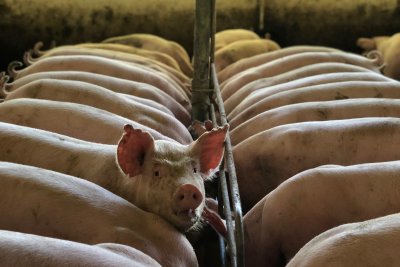Legal challenge finds national climate plans unlawfully inadequate
The High Court has ruled that the UK government’s Carbon Budget Delivery Plan (CBDP) is inadequate to deliver necessery emissions reductions and must be revised within one year.

A landmark legal case has found that the UK government's portfolio of proposed climate change policies are not strong or comprehensive enough to deliver the Climate Change Act targets.
In documents released as part of the case, which was brought by Friends of the Earth, Client Earth and Good Law Project, government officials said they had “low/very low confidence” that around half of the emissions reductions required would be achieved by the government’s existing climate policies. Agriculture and land use sectors have been previously criticised as having the weakest policies of any sector, despite being vital to delivering Net Zero and other goals on food security, health and biodiversity. This points to an urgent need for policies to deliver more sustainable food, farming, and diets.
The ruling means the government must release an improved climate plan within one year. The Committee on Climate Change (CCC) - whose role it is to scrutinise government climate plans - analysed the CBDP in 2023. The committee reported that credible policies were in place to deliver just 19% of the emissions savings required to meet the UK’s Paris Agreement targets of a 68% cut in emissions by 2030.
Are government plans adequate to tackle emissions from food, agriculture and our diets?
Agriculture and land use emissions have remained essentially unchanged over the last decade, and the CCC found that the government had no credible plans to reduce emissions for these sectors (pages 98 and 99).They identified significant risks to climate targets and policy gaps, including:
Land Use: The failure to deliver a land use strategy or peatland restoration scheme is a significant risk factor and severely jeopardises the potential for land becoming a carbon sink by the mid-2030s. The delivery of woodland, tree planting and peatland restoration targets is falling substantially short.
Farming policies: A lack of clarity and funding is hampering uptake and confidence in Environmental Land Management schemes and low carbon farming, which requires stability. A strong set of regulatory baseline standards are needed to ensure sustainable land management irrespective of whether voluntary schemes are adopted.
Diets: The Government has set out no plans to support the public to shift to a lower-carbon diet and further policy intervention on diets is required. The apparent willingness of the public to make dietary changes suggests that more ambitious meat reduction targets are achievable. The only dietary policy is a voluntary eco-labelling scheme, which is considered unlikely to have a meaningful impact.
Reducing methane emissions: Plans to reduce methane, which in the UK comes largely from livestock, aren’t fit for purpose. Livestock numbers in the UK need to reduce in line with reductions in meat consumption.
Trade policy: Recent trade deals have not imposed minimum environmental standards on imports, which risks undermining domestic policy. If changes in UK diets to eat less meat is not accompanied by a reduction in UK livestock numbers, a rise in exports will risk domestic methane emissions or land release targets.
Food Waste: Data is limited and collected infrequently but shows some reduction in food waste between 2007 and 2018. 3.3 million tonnes of food are estimated to be wasted on-farm (2.9 million tonnes of which is deemed edible). At present, this is not included in the Government’s waste reduction plans.
Ruth Westcott, campaign manager for the Climate and Nature Emergency at Sustain said;
“The ruling confirms what we all knew - the government is failing us and future generations by not using its power to tackle the environmental impact of the food system and create a society which is fairer, greener, more equal, and in which everyone can eat great food. Thanks to this brilliant litigation, revising the climate plan will be one of the first jobs for the new government. It must include more policies to bring our diets and farming in line with our climate targets.”
Sustain’s manifesto for good food for the 2024 election sets out key policies for reducing emissions and supporting nature-friendly farming.
Published Wednesday 29 May 2024
Food for the Planet: Food for the Planet is helping local authorities, businesses and organisations take simple actions to tackle the climate and nature emergency through food.





